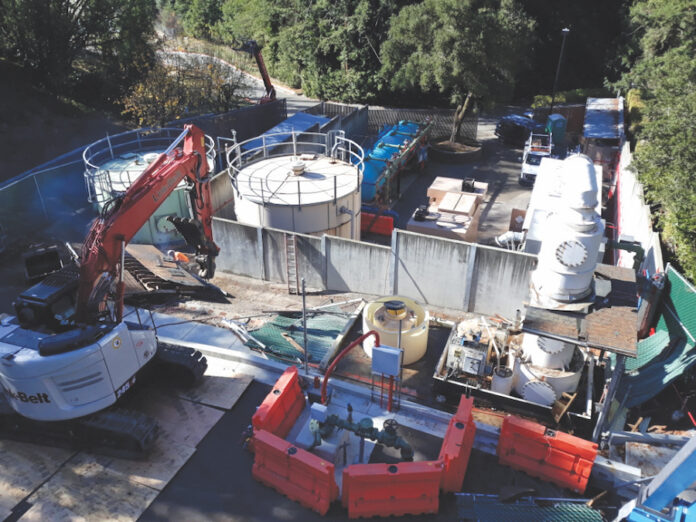The Scotts Valley Water District (SVWD) has begun construction on its largest water treatment plant, Orchard Run.
GSE Construction demolished the 38-year-old plant in December and plans to finish construction by May 1.
The new plant, which provides 1 million gallons of water per day, will greatly improve Scotts Valley’s water aesthetic, said Water District General Manager Piret Harmon.
“Surface water and groundwater taste very different,” Harmon said. “All of our potable water comes from the ground and, at Orchard Run, from wells 1,000 feet deep on the north side of town. There’s a lot of sediments there and it’s high in iron and manganese. Those make up the flavor profile. We have always wanted to improve on the taste and smell of our water.”
David McNair, the district’s operation manager, said “Scotts Valley has been notorious for its taste, a little too much flavor.”
“The waters that we deal with in the aquifer are very challenging to treat aesthetically,” McNair said. “The current state of our technology filtering system is a good basic filter. In many cases that is all you might need, but with our water, especially the Butano aquifer this plant draws from, it’s more difficult.”
To improve water aesthetics, the district will install two new granular activated carbon (GAC) filters, a flow paced chlorine analyzer, a 40,000-gallon welded steel storage tank and odor scrubber. Based on taste tests conducted in 2010, GAC filters are best suited for treating Scotts Valley water, according to McNair. With the new equipment, minerals and chlorine in the water will be much less perceptible.
The new Orchard Run will also connect to the sewer system, unlike the previous plant, saving the district about $3,500 a month in sewage off hauling fees.
SVWD staff intentionally planned construction for the middle of the winter when demand is relatively low.
“We have three treatment plants, but if something was to happen to the other treatment plants, we may have to reach out to our neighbors,” Harmon said.
District members have also implemented emergency infrastructure that would allow for access to the Orchard Run well if needed.
Ultimately, the new plant will cost $3.5 million, the most expensive project for the water district throughout Harmon’s eight years. The district has built up reserves to cover the project, Harmon said.
“Rates will never stay the same, but it’s not because of this project,” Harmon said.










